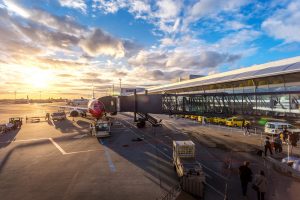The aviation industry is facing a significant challenge in reducing its carbon footprint and transitioning towards a more sustainable future. Sustainable aviation fuel (SAF) has emerged as a promising solution with the potential to significantly reduce greenhouse gas emissions.
While the production of SAF has seen a remarkable 200% increase in 2022, there is still a long way to go to meet the industry's ambitious targets. However, this growing demand for SAF presents a unique opportunity for entrepreneurs to make a meaningful impact and contribute to a greener aviation sector.
Despite the impressive growth rate, SAF currently only constitutes a mere 0.1-0.2% of the worldwide aviation fuel supply. The International Air Transport Association (IATA) estimates that by 2050, the industry will require 450 billion liters of SAF to achieve its net-zero goals, relying on SAF for 65% of the necessary emissions reduction.
Leading the way in this transition is logistics giant DHL, which aims to utilize 30% SAF for its air transport operations by 2030.
DHL has already secured agreements with major suppliers, such as BP and Neste, to obtain over 800 million liters of SAF within five years. These initiatives highlight the urgency and commitment of industry leaders to embrace sustainable alternatives.
To bridge the gap between the current supply and the future demand for SAF, the industry is gearing up to boost production capacity significantly. IATA predicts a remarkable 400% increase in biofuel refinery capacity by 2025 compared to 2022. Major players, including Neste, are planning substantial expansions in their SAF production.
Neste, a leading renewable fuel producer, is set to increase its SAF production from 100,000 to 1.5 million tonnes by the end of the year. To achieve this, Neste is expanding its production facilities not only in Finland but also in Singapore and the Netherlands.
This expansion, coupled with the efforts of other oil majors and renewable fuel producers, could result in a global production capacity of five million tonnes of SAF by 2025.
As the demand for SAF continues to soar, entrepreneurial opportunities abound for those passionate about sustainable aviation and seeking to make a difference. Traditional oil refineries can leverage their existing infrastructure and expertise by modifying feedstocks and adapting equipment to increase SAF production capacity.
Flexible feedstock facilities have the potential to maximize SAF manufacturing capacity, providing a cost-effective and scalable solution. From novel feedstocks to advanced production methods, entrepreneurs have the chance to revolutionize the SAF sector and contribute to the global transition towards greener aviation.
Despite the current shortfall in production, the upward trajectory of SAF presents an unprecedented opportunity for entrepreneurs to create sustainable solutions and accelerate the transition to net-zero emissions. By capitalizing on the increasing demand for SAF and exploring innovative approaches, entrepreneurs can carve out a niche in the aviation industry while helping to shape a more sustainable and environmentally conscious future for air travel.




















